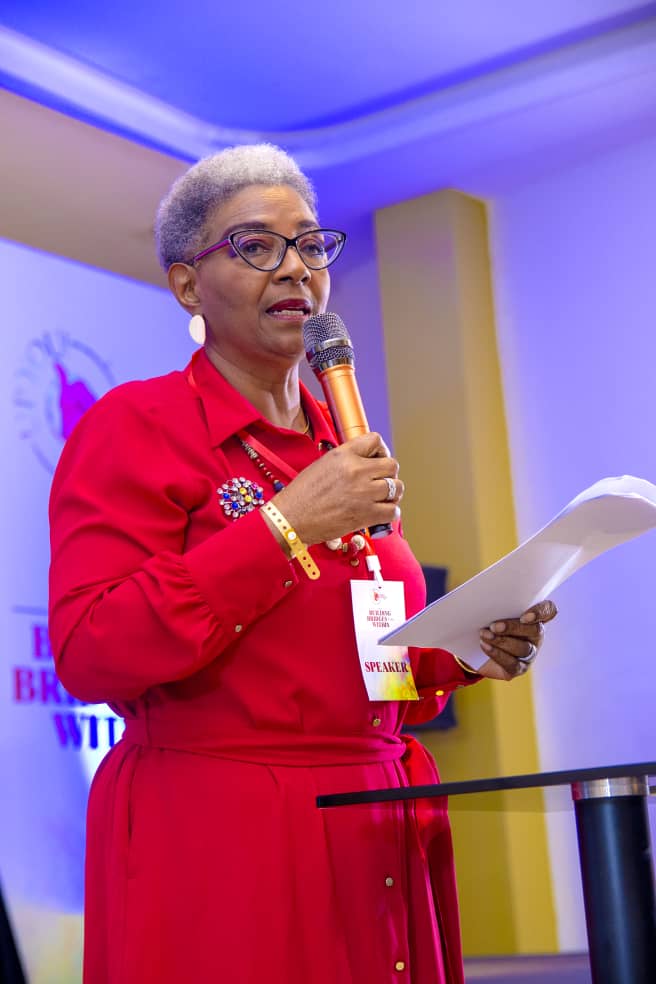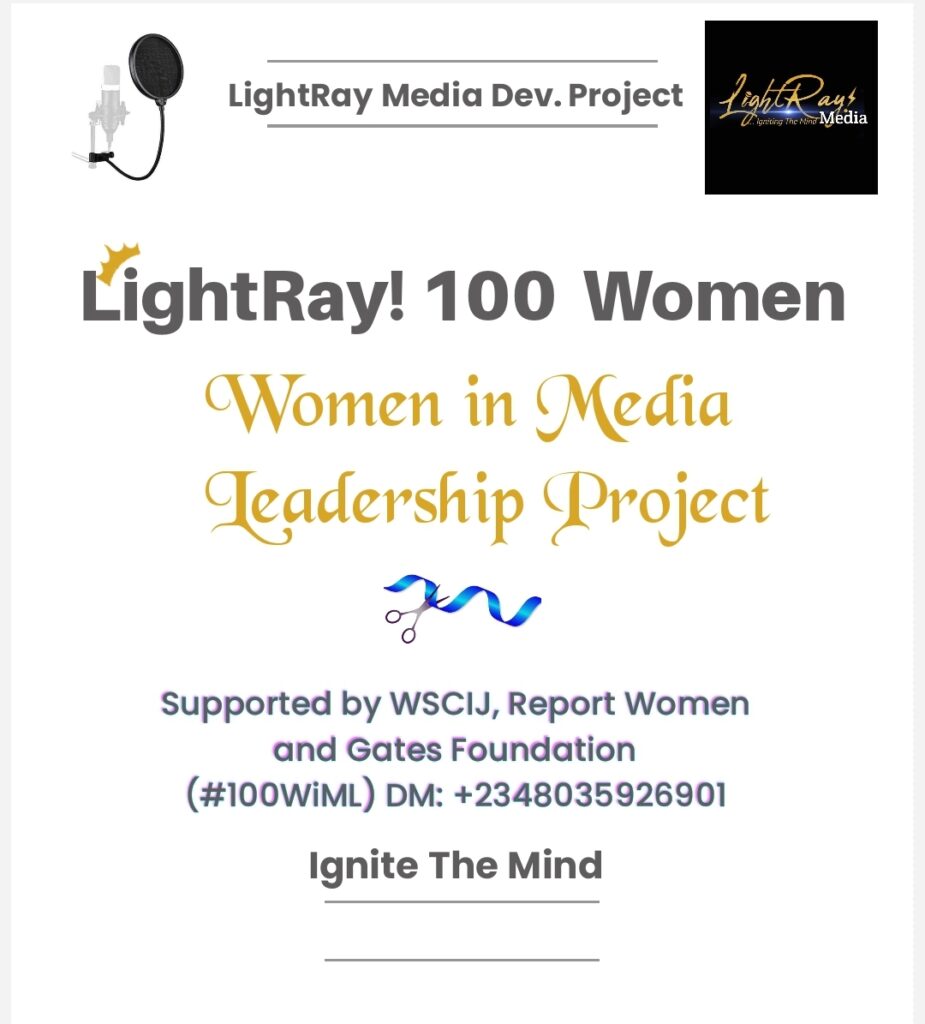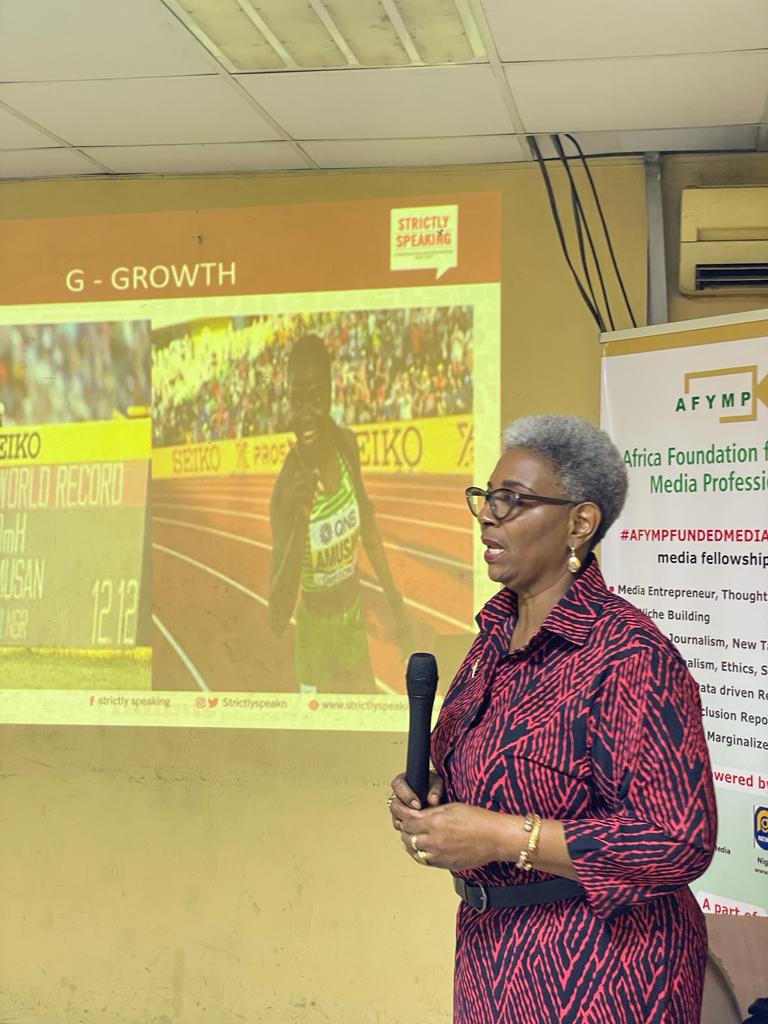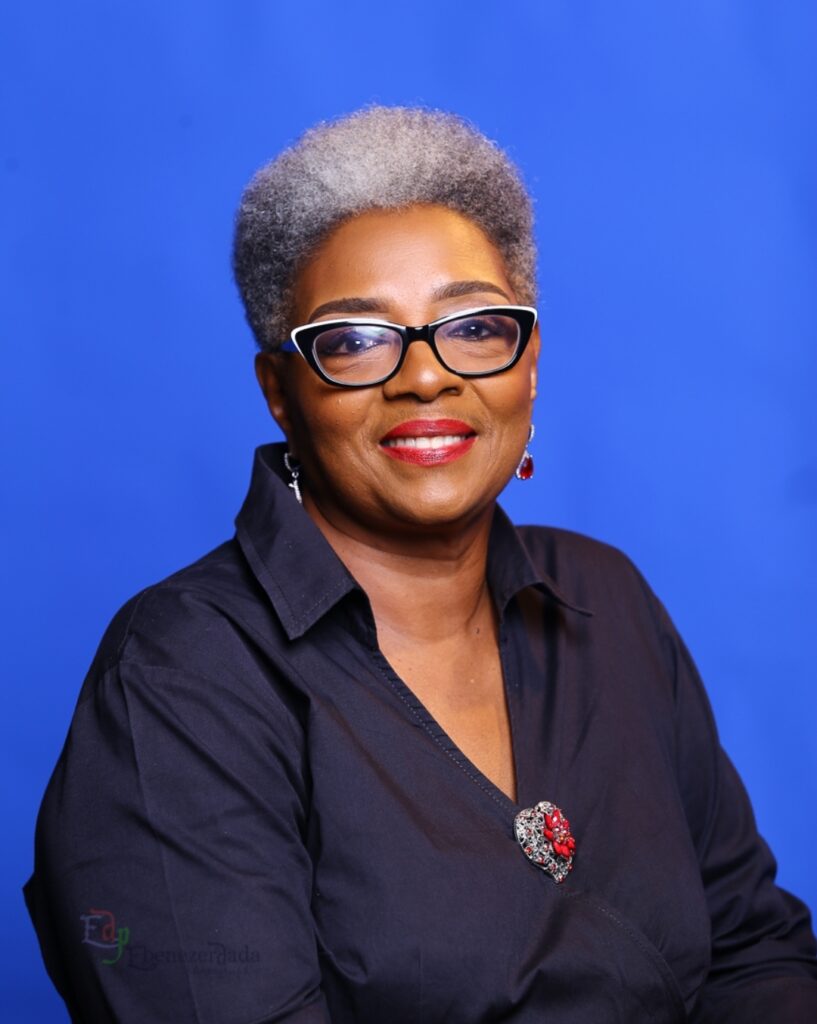Media organisations should have equality policies that advance women into management – Strictly Speaking Veteran, Bimbo Oloyede
Age is, but, a number. That expression encapsulates Madam Bimbo Oloyede, who, despite having garnered three dozens and a quarter of dozen number to her existence on earth, continues to give younger women who are digital natives and digital adopters including the tech laggards a good run for their relevance, expertise, personal development and impact.
With over forty five years spanning her foray across the media landscape, Aunty Bimbo, as some of us fondly call her, adds her voice in this Special LightRay! 100 Women in Leadership Development Series along with other Women in the media calling on Media Owners and organisations to have better corporate governance systems in place that inspires a well-thought out workplace policy that enables women in media to stay relevant and advance in their careers with a view to increasing the staying power of more women into media leadership positions.
Come with us and let’s have a tea-table talk with an extraordinary witty storyteller, broadcaster and role model with incomparable impact.
It’s such a privilege to have this sit-down with you Aunty Bimbo. You are one of the veterans in the Nigeria media industry spanning decades in the media and communications space. When you compare when you started your work in the media and seeing today that the digital space is the new currency for the media, how important is this shift at this time, as you watch the media evolution happening in Nigeria and globally?
Covid taught everyone that the digital space is as vital as traditional media options, so there is no need to pretend that the digital revolution hasn’t happened. What we should be doing is finding professional and credible ways to utilise it to the best of our ability so that we don’t limit what we have to offer in terms of information, education and entertainment.
Has this change personally affected your career trajectory, and what you do in this space?
It has greatly affected me because I realise that if you ignore this space you do so at your own peril! If you are a professional media practitioner and you want to remain relevant, you must find a way to be visible on various digital platforms. I try to be as active as possible on LinkedIn, Instagram and Facebook.
Do you think tech, AI, and digital skills are important for a journalist?
Absolutely, especially when it comes to AI. Sometimes when you are writing a script or an article, you need new ideas and information. As long as you can ask the right questions, AI will definitely give you some pointers that help you to flesh out your story or script. It’s a technology that should be embraced but some caution is also necessary; one should not rely on it hook, line and sinker. A practising journalist or reporter would also be lost these days without basic digital skills because speed is of the essence to get your story out. Editors are impatient so journalists should be digitally literate.
How much has your career changed for you? And what spaces in your career journey have you found yourself working in by choice or as you went with the flow?
My career made me become a recluse because I always felt that a News Anchor should be as neutral as possible and credibility is imperative if you are to be accepted by the public. This meant that I distanced myself from several types of gatherings and even some engagements that would have been financially beneficial. Nevertheless, being an anchor also gave me the opportunity of being invited to compere various events over the years and enabled me to become a trainer. I equally recognise that these experiences and my interaction with people prompted me to become an author too.

Madam Bimbo Oloyede, CEO, Strictly Speaking.
There is a heavy masculine tilt towards the news and many programmes are subjective when it comes to gender representation, gender balance and female concerns. If our society is to develop along equitable lines, we need practitioners that can apply a gender lens to issues and I don’t see that coming from the majority of men. They don’t know where the shoe pinches because they don’t have the same challenges. Some are sensitive but they are in the minority. If we really want content to be objective, more competent women should occupy top positions in the media and communication space.

What more do you think the media and development space can do more, or gaps that you’ve identified need to be closed?
More attention needs to be given to education, good governance and gender concerns. The yawning gaps in education are very alarming and government needs to be held accountable for the education of our children. It’s very important for the media to champion the need to develop curriculums that serve the development of our people in such a way that they can become useful citizens that are knowledgeable about governance, their role as citizens and their responsibilities to society. Our students also need to be employable when they graduate. Basic life skills and literacy skills are missing too.
Talking about life skills, what kind of support do you think women in media and communications need to overcome different forms of barriers to excel and thrive? And why do you think having these kinds of support is important?
I think that media organisations should have equality policies that make it mandatory for a percentage of senior positions to be given to female practitioners. I have no doubt that there are enough women with the requisite capacity to do the job, so I am not asking for favours and I am not suggesting tokenism. I know that such spaces should be filled on merit and not as a right. The truth is, there is a heavy masculine tilt towards the news and many programmes are subjective when it comes to gender representation, gender balance and female concerns. If our society is to develop along equitable lines, we need practitioners that can apply a gender lens to issues and I don’t see that coming from the majority of men. They don’t know where the shoe pinches because they don’t have the same challenges. Some are sensitive but they are in the minority. If we really want content to be objective, more competent women should occupy top positions in the media and communication space.
When you look at the broadcast industry where your media journey began, which aspects of broadcasting gives you concern and how do you think that area can be addressed?
It is difficult to criticise broadcasters when they have not been given good foundations and when they are not exposed to mandatory training at different levels. Training is a major concern to me. I think there should be basic, intermediate and advanced training programmes which broadcasters should attend before attaining each level. Talent is not enough. Apart from being exposed to new techniques and practices, practitioners need to share experiences and agree on modes of conduct so that we establish and maintain acceptable standards. New entrants into the profession should see structure, process, progression and ultimately, rewards.
You have always stood for women advocacy and development in the media. Tell us what your journey as a mentor with the WSCIJ-FRLP Fellowship has been like. What evolution have you noticed between how women in media were during your early years compared to what operates today.
I am very pleased to have been a mentor under the WSCIJ-FRLP Fellowship. It is an excellent programme that exposes female journalists to new skills and techniques in investigative reporting. Beyond that, it develops their way of thinking, teaches them life skills and enables them to belong to a strong network of like minds. It also gives them a safe space to share ideas and information and challenge each other to keep improving their performance levels.
In earlier years media women seemed to operate within their specific media organ – they stayed in their lanes. Nowadays the lines have blurred. With the converging of media applications, journalists require multiple skills and our female colleagues are more flexible, realising that to get ahead, the ability to operate across board is now a given. That seems to be the biggest difference between then and now and it’s a welcome development.

Madam Oloyede, a professional per excellence. PC: Oloyede.

“It is difficult to criticise broadcasters when they have not been given good foundations and when they are not exposed to mandatory training at different levels. Training is a major concern to me. I think there should be basic, intermediate and advanced training programmes which broadcasters should attend before attaining each level. Talent is not enough.” – Oloyede.

“New entrants into the profession should see structure, process, progression and ultimately, rewards.” – Madam Oloyede.
When was the first time you knew journalism was going to be your passion and career?
I had no idea that I would be a journalist. I found myself in journalism by accident. It was not planned but having ‘landed’ in this space, I realised that it was a fascinating and interesting space within which to operate and it also enabled me to express myself in other ways that appealed to me.
At what point did you feel your career was no longer just a job you showed up to? How did you pivot or even change the course of your career?
In the early days at NTA, we were in the newsroom even on our days off so this ceased to be a job to me over four decades ago. Perhaps if I had seen it as a ‘job’, I might have stopped doing it. I was fortunate enough to have several opportunities and when I established my NGO, it opened a whole new way of utilising the media.
What were some of the struggles for you in the early stages of your career, and how did you overcome them?
I spent only 5 years at NTA before resigning and it took me 16 years to come back to broadcasting but I was compering and doing voice overs while I was off the screen. Also, my husband and I established a TV production company, which he ran. When at a time advertisers cut back on TV commercials, I established a supermarket and between the two incomes we were able to keep going. Eventually, I went back to TV as an independent producer, and registered the NGO before being invited to anchor The News at Ten on Channels TV. I did that for 13 years.
Do you still have any current challenges you’re trying to overcome?
I have many ideas for programmes and getting them off the ground is still a challenge. I am always creating programmes that I believe will fill certain gaps but generally stations don’t really pay for programme ideas in this part of the world so those ideas may remain in black and white for now.
What are some of the barriers you think has prevented you from hitting the career target you’ve set for yourself?
Funding is the major barrier because producing programmes, especially drama, is expensive. Even radio drama is not cheap.
And how do you plan to overcome them? Why is it important for you to overcome them?
It is important to overcome this barrier because there are certain messages and concepts that should be in the polity if Nigeria is to develop equitably. I think the way to do this now is for me to resuscitate my NGO and try to attract funding for my programmes. That is what I did in the past and perhaps it is time to revisit that path.

“I am very pleased to have been a mentor under the WSCIJ-FRLP Fellowship. It is an excellent programme that exposes female journalists to new skills and techniques in investigative reporting. Beyond that, it develops their way of thinking, teaches them life skills and enables them to belong to a strong network of like minds. It also gives them a safe space to share ideas and information and challenge each other to keep improving their performance levels.” – Madam Oloyede.
What are some of the stories or projects you’ve done that was the most impactful in the course of your career?
I was a News Anchor, so over the years I presented hundreds of bulletins (stories and reports) and conducted interviews on topical issues. However, as a producer, I midwifed a radio and TV drama series on anti-corruption and conflict resolution. It was called Tightrope. Gender based violence has also been one of my focus areas and we produced Trauma for TV, which we did in partnership with Project Alert on Violence against Women. We also produced Voices for radio, another series on SGBV. I also initiated an award ceremony called Rare Gems, which identified and rewarded those who were contributing to the development of women. It was aligned to the Millenium Development Goals.
Do you still intend to set any career projection for yourself you intend to meet up?
I am not sure what career projection I should be thinking about at the age of 69. What I do know is that this is not a space that you really retire from so I have some ideas I am working on which will soon materialise.
What training programmes or short courses have you attended, which you applied on the job that made the most impact for you?
One of the most impactful courses I attended, was a Train the Trainers course run by the BBC. It completely changed my approach to training and gave me a new perspective about teaching and learning. Another one was a training in Washington DC on anti-corruption, which was sponsored by USAID. It opened my eyes to a lot of things I had not thought about before.
What suggestions will you give media owners or heads of media business to help boost morale, effectiveness, and reduce toxicity in the workplace?
The main suggestion would be to create training opportunities for their staff. These are safe spaces for them to learn, improve, share and vent. Several media owners seem to be reluctant about training their staff because they feel they will take away their new knowledge. They however forget that they have a greater responsibility to the profession itself. They should be leaving it better than the way they found it.
If you were to reimagine your career, what would you do differently, starting today?
I would spend more time reading and be more involved in international events.
How and what can women in media begin to do differently and better to hold their own space within the media industry?
At a certain point in their careers, they should think about specialization. There are many aspects to different subjects that are waiting for someone to pick them up and run with them. When you become an expert in a particular area, you are sought after and it can be used as a stepping stone to other opportunities. Media women should be more creatively discerning to cement their places, focusing more on stories and subjects that elevate the contributions of their fellow women. The ridiculously low percentage of females in decision making positions, is a huge cause for concern. Female media practitioners should highlight the activities of women who are helping to better the lot of women and make society conscious of their contributions.
Tell us about some of your accomplishments that make you proud of yourself and continue to inspire you to do more?
I was a pioneer female Newscaster on national television in Nigeria. Field experiences that I have had and reactions that I sometimes get to either my presentations or my training programmes, are a continuous inspiration to me.
What tips in personal development, career pursuit, network strategies, and wealth creation would you advise other women in media, including men, to tap into?
Most media practitioners are multi-talented, although they don’t realise it. They should assess their abilities and build on their strengths with the intention of monetising their identified capacity. It’s a very wide sky and there’s room for everyone to fly, but first, they must make the time to pinpoint the gift that serves them best. Networking helps them further their careers and learn about available opportunities.

Madame Bimbo Oloyede. PC: Oloyede.
In earlier years media women seemed to operate within their specific media organ – they stayed in their lanes. Nowadays the lines have blurred. With the converging of media applications, journalists require multiple skills and our female colleagues are more flexible, realising that to get ahead, the ability to operate across board is now a given
How do you balance your personal life, work, and family expectations, if there’s such a thing? Which aspects give you the most challenges, and how were you able to overcome them?
At this point if I don’t know how to balance work, family and personal life, I probably never will. I have learned to obey my body when it gives me signals and to gauge when I am needed for family matters. My family comes first but I am sure they would say that I am a workaholic. The truth is, I cannot relax until I have discussed or documented my idea and usually, I don’t see it as work.
Tell us something about the media industry you would like to see change for the better? And why is this change important?
I would like to see radio and TV stations empowered to commission more programmes from independent producers and presenters because a lot of talent is going to waste and the public is the ultimate loser when good ideas remain dormant and creativity is not encouraged.
In the next 3-5 years, where do you see yourself?
Exploring my acting skills, writing more books and presenting more TV programmes. I will also be sharing my knowledge and experience in different ways on different platforms.
What are your current role and responsibilities you handle.
I am the lead consultant at Strictly Speaking where we are concerned about building people’s capacity to express themselves fluently and communicate effectively. We share allied information accordingly and train/facilitate when invited.
How do you think the Nigerian media can up its ante to compete more favourable with international media organisations?
Our media practitioners should make the effort to attend courses where possible, even if they sponsor themselves. Sharing experiences with other professionals is very rewarding. They should also make the time to read, watch and listen to international blogs/articles/stations, so that they have a comprehensive picture of issues and happenings. I usually ask them if they want to be their professional journalists who happen to be working in Nigeria or Nigerian journalists who are limited to this environment alone.
In your years on the job, have you ever experienced burnout, mental fatigue, or mental health crisis? How did you handle it? How can women and men in the media reduce burnout, mental health breakdown, or prevent it?
I would advise media practitioners to know their limits, especially those who are constantly under the gaze of cameras. The pressure is real and being bombarded with bad news daily, can sometimes take its toll. Having a hobby that is unrelated to your job is helpful, as is exercise and family time. Personally, I have not experienced burnout but when I was caring for my late husband, it became difficult to concentrate on anchoring the news effectively and that was one of the reasons why I stopped.
Let’s talk about online harassment… have you experienced it in any form? Or any other threats on the job? How did you deal with it? What steps can women in media take to prevent or deal with online harassment etc?
I have had the occasional disturbing phone call but otherwise, I cannot recall harassment on or off-line.
If you were to suggest women, indeed journalists in general, can up their ante on online security and how women deal with online harrasment, what tips would you give?
If posts are more professional than personal, there would be less information for predators to feed off, especially if the names and faces are known.
What are some common mistakes you have observed journalist make in the course of their career you’ve observed? And why do you think this happens?
One of the most common mistakes journalists make is choosing to keep their list of contacts to themselves. This does not help anybody and does not keep the work going smoothly. I presume they feel that it is their exclusive right to have access to certain people. It’s time we let go of that idea. One day you will need help too! Another common mistake is in pronunciation. Some journalists don’t think it’s important for them to speak well. To me, it doesn’t matter if you’re a broadcaster or not, every journalist should learn to speak properly in their language of communication. If it is French, English or Swahili, just speak the language fluently and try to pronounce words, names and places correctly.
How do you chill, relax, while giving attention to your wellbeing?
I go for a walk every morning and I like to watch films and some TV series. I also attend functions that interest me. My children’s friends are an interesting bunch so I also enjoy their company when we are together.

“I would advise media practitioners to know their limits, especially those who are constantly under the gaze of cameras. The pressure is real and being bombarded with bad news daily, can sometimes take its toll. Having a hobby that is unrelated to your job is helpful, as is exercise and family time. . .” Madam Oloyede.





Comments